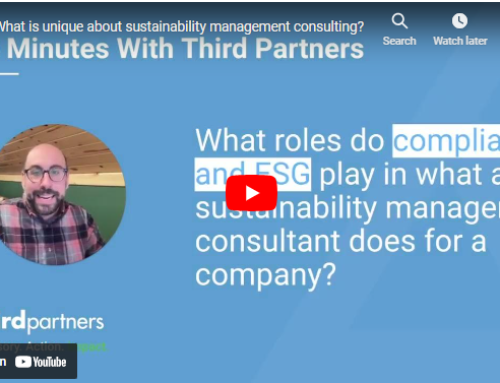Why are people fleeing an abominable monster made of Keurig K-Cups while millions of K-Cups fired from a flying saucer pile up on city streets? The two minute K-Cup invasion video by Halifax-based Egg Studios parodies the waste created by Green Mountain Coffee’s flagship Keurig brand. Recent reports indicate annual plastic K-Cup waste could circle the earth 11 times.
Tweets, likes and shares of the invasion video are split between greens who hail the assault on non-recyclable waste and a more mainstream coffee-loving crowd eager to drip criticism upon the brewing injustice of the K-Cup.
For brands, the consumer-driven #KillTheKCup campaign is not just a lesson in how to keep from being trashed all over Twitter. It is a reminder that products like the plastic K-Cup are eternally at-risk of being called out for wastefulness, from the very first day the product is launched. A product built on single-use plastic fails to consider many consequences which are external to the purchase price.
The K-Cup invasion video shines a spotlight on coffee behaving badly
The story of Keurig’s rise sounds right at home among other brand success stories: invented by college roommates, venture capital funded, bought out by a bigger firm, global success. However, in 2015 the difference between a beloved product and a reviled product can be razor thin.
A truly healthy bottom line requires brands to have rock solid strategies for consumer health, solid waste footprint, and the other ways that a product impacts the world before, during and after use. This is where the Keurig K-Cup falls short.
Brewing a safe , tasty and economical cup of coffee by forcing hot water through a plastic cup is a mythical pursuit. Even BPA-free plastics contain questionable chemicals linked to hormone-disrupting behavior. Municipal recycling plants cannot handle the K-Cup — many do not even accept the type of plastic it is made from. From a sustainability standpoint, Keurig’s success is a K-Cup castle built upon the sand.
There is no effective damage control for the inherently unsustainable
In response to the video, Keurig’s Chief Sustainability Officer issued a statement reiterating the company’s goal to make K-Cups recyclable by 2020.
Meanwhile, Keurig’s image-boosting approach is to charge consumers $50 to $100 for collection boxes to mail back used K-Cups. Keurig’s Grounds to Grow On website is designed by a marketing-savvy recycling company that makes money by burning the K-Cups in a waste-to-energy facility and by composting the coffee grounds.
Is the Keurig product takeback program really growing anything but PR? According to a recent statement from Keurig, they have collected a total of 17.4 million K-Cups through the takeback program. That equates to a meager 0.18% of the 9.8 billion K-Cups Keurig sold in 2014 alone.
Unfortunately, there is no way to backtrack environmental, health, or financial impact from an inherently unsustainable product achieving such mammoth sales volume. Pledging to make your product recyclable 12 years after introducing it is a gigantic sustainability punt exemplifying the old PR truism “delay, delay to make it go away.“
For the past several years, Keurig has been one of thousands of brands attempting to greenwash their way to shareholder profitability by wrapping flawed products in sustainability reports , materiality matrices and voluntary takeback programs.
The better approach is to incorporate triple bottom line principles and life cycle thinking throughout the operating principles of the organization. Genuine, measurable action is more valuable than all the reports a company can generate. Executing on a sustainable vision takes leadership by corporate executives at all stages of product development. If a product such as the K-Cup cannot be produced, used, and recycled responsibly, it is not ready for market.
Note to Martians: send even more UFOs to shoot K-Cups in 2015
The road to Keurig’s growth is paved with plastic waste. In 2015 Keurig will partner with Coca-Cola in a massive marketing and production push to expand the K-Cup market into the cold and carbonated beverage space. For the foreseeable future, it is straight to the landfill for the overwhelming majority of used K-Cup pods.
Waste is far from the only sustainability issue in Keurig’s product category. Water security, sustainable agriculture and climate change are critical elements of the sustainable beverage landscape.
The high-profile sustainability chief at Keurig Green Mountain appears to be active on several issues to reduce the big picture footprint of the firm. One of Keurig’s sustainability goals is to reduce the greenhouse gas footprint 25% by 2020. Additionally, Keurig makes annual contributions to at least two nonprofits to promote clean water access and sustainable farming in poor countries that are part of the coffee supply chain.
Make no mistake, sustainability goals and donations are important but they do not undo harm or assure responsible growth. Where plastic packaging waste is concerned, U.S. municipalities and consumers are paying the price.
Brands banking on disposable innovations to drive profit need to listen to the ominous #KillTheKCup message. There is a clear transmission beaming in from outer space: if you build your business on plastic trash and mediocre coffee, you can only bury the problems in a landfill for so long before a UFO digs it up and shoots it back at you.



